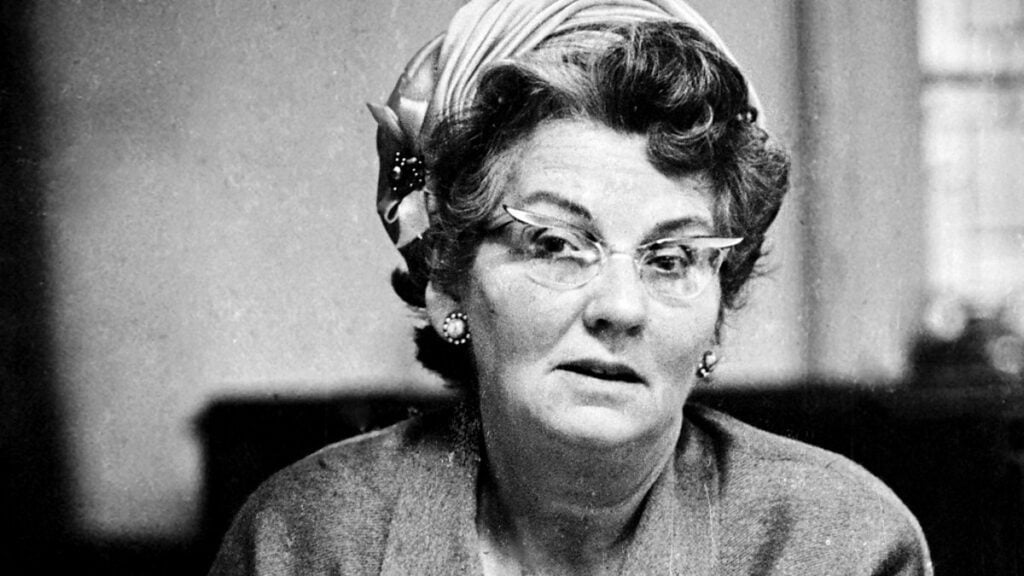Rock and Roll was known as the devil’s music when it first was popularized in the 1950s. Older individuals who believed so shunned the younger generation who created and listened to it. Others went as far as taking action to stop its spread. Mary Whitehouse was one of them, but her efforts had a reverse effect on her intention.
Conservative activist Mary Whitehouse successfully stopped Alice Cooper from playing on BBC’s “Top of Pops” music show. But her action led to Cooper’s songs rising to number 1. Cooper then sent her flowers as a token of gratitude.
Who was Mary Whitehouse?
Mary Whitehouse was born on June 13, 1910, in Nuneaton, Warwickshire, England, UK. Whitehouse came from a below-average-income family and got into Chester City Grammar School through a scholarship. After her apprenticeship in St. John’s School in Chester, she took an interest in teaching.
Whitehouse became an art teacher at Lichfield Road School then Madeley Modern School in Madeley, Shropshire, in 1960. This was after getting married and while raising her kids. Her role in Madeley also included her teaching about sex education.
Due to her background as a devout Christian, Whitehouse became concerned about her perceived declining moral standards in the British media, more specifically the BBC. Whitehouse became an activist in the early sixties. Her first action was to write to BBC’s general director Hugh Greene, requesting a meeting to discuss her views on the media. Greene’s deputy met with her instead, but Whitehouse felt her requests were not acted upon.
By 1964, Whitehouse launched the Clean Up TV Campaign, or CUTV. It targeted the women of Britain. Greene became Whitehouse’s arch-nemesis. She believed that Greene was responsible for the country’s moral collapse by allowing the BBC to spread the propaganda of disbelief, doubt, dirt, promiscuity, infidelity, and drinking.
The following year, the Clean Up TV Campaign petition gained 500,000 signatures. This resulted in Greene blocking Whitehouse from any participation in any BBC broadcasts. Whitehouse launched The National Viewers’ and Listeners’ Association, also known as Mediawatch-UK, to replace CUTV and actively campaigned for legislative change.
She wrote numerous letters to several shows that the BBC aired and various performers and writers throughout the years. However, the people she wrote to started to irritate her.
She went on with her crusade until she stepped down as president of Mediawatch in 1994. Whitehouse lived the remainder of her life in peace until she died on November 23, 2001. (Source: People Pill)
The Unlikely Relationship of Alice Cooper and Mary Whitehouse
Alice Cooper, an American rock singer from Detroit, became famous in the late sixties. He and his band were known for their extremely outlandish acts on stage and wrote songs with vulgar context. Their brand of rock and Roll traveled across the seas and to the UK, where several fans welcomed their unique take on music. (Source: Britannica)
BBC started airing the band’s songs in their Top of the Pops music show. Half-expectedly, the broadcasting company received a letter of concern by their most public nemesis, Mary Whitehouse, about the said American band.
On August 21, 1972, Whitehouse wrote to the BBC, complaining about Alice Cooper’s School’s Out song. The letter stated that the song encouraged British children to imbibe a culture of violence and anarchy. She complained about the music video and the song itself. This caused the BBC to ban the song altogether. (Source: The Guardian)
Due to the banning of the song, it reached the number 1 spot in the British charts. It was played in many different stations at the time. In an interview with Cooper, he mentioned that Whitehouse’s complaint contributed to his popularity, much like a great marketing and PR strategy. Cooper was so delighted at the turn of events he sent a thank you note and a bouquet to Whitehouse. To this day, Cooper still acknowledges Whitehouse’s contribution to his career. (Source: Sunday Post)
